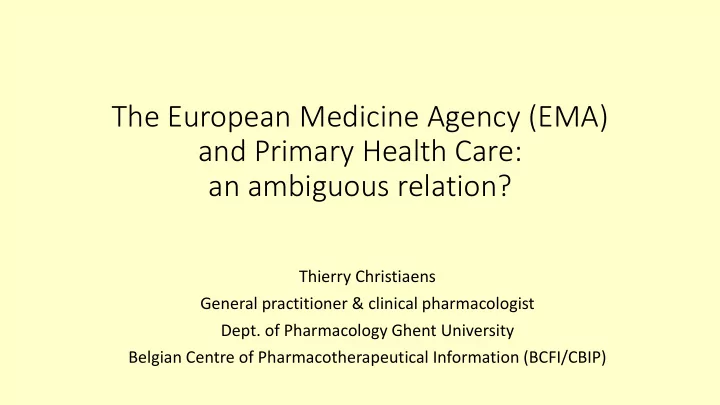

The European Medicine Agency (EMA) and Primary Health Care: an ambiguous relation? Thierry Christiaens General practitioner & clinical pharmacologist Dept. of Pharmacology Ghent University Belgian Centre of Pharmacotherapeutical Information (BCFI/CBIP)
What does primary health care (PHC) expect from EMA? • IN GENERAL • Trustworthy/ Reliable • Transparent/ Independent • Scientific • Not (too) bureaucratic • CONCERNING PHC • Considering risks and not only effect/benefit • Considering PHC epidemiology • Considering costs
Considering risks and not only effect/benefit, considering PHC epidemiology and costs. • Some examples of decisions about risk, unclear for PHC : • Risk evaluation glitazones, domperidon, cyproteron after EMA evaluation ‘ still positive benefit/risk’ for broadly used products with existing safer alternatives • EMA asks only placebo comparisons and not comparative trials with (older) drugs impossible to have an evaluation of the true added-value of a new drug, essential for PHC. Proposition for all drugs but certainly those used in general practice: Requirement of comparative trials within 5 years after commercialisation?
Considering risks and not only effect/benefit, considering PHC epidemiology and costs. • PHC epidemiology is highly relevant in selection of populations in the trials: • even for typical PHC pathology, trials including only/mostly hospital patients result in unscientific conclusions for PHC because of selected population: these patients have often no effect on first line treatments, are more ill and need more aggressive treatments, hence they are not representative for PHC patients
Examples of biased populations • How representative are clinical study patients with allergic rhinitis in primary care? David J. Costa et all J Allergy Clin Immunol. 2011;127:920-6. “Only 7.4% (95% CI, 4.5% to 10.3%) of the patients seen in primary health care would have been enrolled in the RCTs…” • Most studies on diabetes type 2 (typical PHC problem) done in hospital patients recent new antidiabetic drugs gliflozines (SGLT2-inhibitors) - again - the same population selection
Considering risks and not only effect/benefit, PHC epidemiology and considering costs • In PHC we feel implicated in the discussion on affordable health care (WONCA definition of GP ” makes efficient use of health care resources ”) • New drugs have very high prices but mostly for rare diseases (cancer, metabolic diseases) • It becomes more troublesome when it concerns common problems like hypertension, diabetes, arthrosis or .. hypercholesterolemia
Hypercholesterolemia: the PCSK9 inhibitors • Hypercholesterolemia in about 50-70% of adult Europeans , >>> PHC problem • New lipid medication PCSK9 inhibitors : (monoclonal LDL-receptor antibodies) Evolocumab and Alirocumab • Used on top of statins in the studies, only surrogate endpoints (↓ LDLcholesterol) • Accepted indications : familiar hypercholesterolemia ( OK, real potential improvement in very high risk ) but also hypercholesterolemia “in people not tolerating statins ” ( ???) • Price: >5000 € /year ( >< simvastatin 40mg ~100 € /year) potential (extra) threat for social security systems in Europe EMA not critical enough in acceptance of indications (and the consequences) Requirement of studies with hard endpoints (morbi-mortality) within 5-10 years?
Conclusion • Europeans need EMA and certainly PHC does. • From the start (endpoints, comparators) to the end (cost, safety) EMA decisions are crucial for PHC and the whole European population • To do a better job, EMA needs more input from critical PHC clinicians • Drug policy and rational use of medication is too important to leave to the lobby groups, bureaucracy and hyperspecialised experts seeing only atypical patients.
Recommend
More recommend